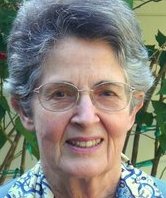I Am Starr King: Interview with Arliss Ungar
Arliss Ungar
Chair of the Balázs Scholars Committee
Former Chair of the Board of Trustees
Author of With Vision and Courage: Starr King School for the Ministry: The History of its First Hundred Years
 Why did you decide to serve Starr King in the many ways that you have?
Why did you decide to serve Starr King in the many ways that you have?
I was working in my local church, and I figured that there was only so much I could do to make things better. But that if I could help students who are going into the ministry, I could increase manifold the influence that I could have for good in the world.
Can you tell me about what the Balázs Scholars Program is and why it is important to the formation of Starr King students?
The Balázs Scholars Program brings, usually, a young Transylvanian minister to study at the school. And it is important for two reasons. One is for students who come over here as ministers, because they go back to their country and have a chance to think about new ideas and new ways of doing things. As a group now—it has been going on for over twenty years—is a formidable force in helping Transylvania, which is part of Romania, to come into the new world in new ways, and at the same time retain those traditions that have held it in good stead for hundreds and hundreds of years.
And it is important for Starr King students to have some sense of their roots, of their history, and of Transylvania, the place where Unitarianism started more than 450 years ago. It is a chance for Starr King students to learn about a different culture and about how people deal with oppression. We hear about it so much, but it becomes a reality to listen to the Transylvanians who are enduring oppression—because of their ethnicity [Hungarian] and their Unitarianism—and how the cope in the world today.
Why did you decide to lead the Balázs Scholar Committee?
Because I feel so strongly that this is a good program. And because I really enjoy it. It is a wonderful chance to meet people from a different culture, a chance to go over there and visit them in their homes. It’s a chance to work with a small group of dedicated volunteers who for twenty years—and some of us have been there for that whole time—work together. We meet once a month to help the scholars to come here. We help the scholars get visas, passports, transportation, housing—everything from car seats for their children to volunteers to donate some time to take the children to preschool to helping them decide what classes to take. So there is a lot of work to be done, and we have a good time doing it together.
You wrote With Vision and Courage: Starr King School for the Ministry: The History of its First Hundred Years. What inspired you to write this?
Rebecca Parker asked me. What she wanted was a booklet that she could give out to for the 100th anniversary of the establishment of the school and she asked me to write it. And I said, ‘Well, how long should it be? What limitations should be set?’ She said, ‘Take whatever length you need.’ Well it turned out almost 500 pages. And Rebecca had to have my daughter, who is a professional editor as well as a minister, redact it down to a suitable pamphlet.
But I really enjoyed it. I felt like this history needed to be recorded. It was a lot of bits and pieces of paper in our library tucked away in various places. So it took a lot of detective work to try to find as much information as I could. And I had the opportunity to interview a number of the students over the years, even going back to those students who were here in the 1940s and learning about what the school and lives were like.
In your research, what have been some the most meaningful moments in Starr King’s history?
The meaningful moments, I think, were the times when Starr King needed and accomplished reconstituting itself. At the start of the school, when Wilbur came with, as he said, no money, no books, no students, no nothing, and he built a school. This happened again later when Josiah Bartlett came. He, again, reconstituted how the school was going to get teachers and how the school was going to get students. When Rebecca came, again, it was a time of rebuilding, this time with a great emphasis on countering oppressions. And I think those were probably the most meaningful parts of the school’s history.
My stipulation in writing the book was that I was going to write it as I learned it—the good parts and the bad parts. And there were times when things were really tough. And there were, of course, times that were very joyous and very creative. And I really enjoyed writing this.
Want to share your story? Send your story to communications@sksm.edu.